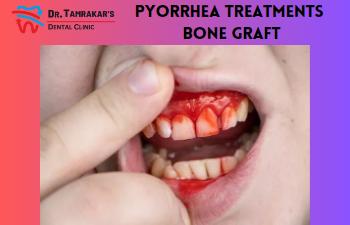Pyorrhea, also known as periodontitis, is a serious gum disease that can lead to tooth loss if left untreated. The treatment for pyorrhea typically involves a combination of professional dental cleaning, at-home oral hygiene practices, and possibly medication. Here are some common treatments for pyorrhea: Professional Dental Cleaning: Your dentist will remove plaque and tartar buildup from your teeth and gums using a procedure called scaling and root planing. This deep cleaning process removes bacteria and infection-causing substances from your teeth and gums. Medications: Your dentist may prescribe antibiotics to help reduce inflammation and infection in your gums. Topical antibiotics, such as mouthwashes or gels, may also be used. Good Oral Hygiene: Maintaining good oral hygiene is crucial for preventing and treating pyorrhea. Brush your teeth at least twice a day, floss daily, and use an antiseptic mouthwash to reduce bacteria in your mouth. Lifestyle Changes: Quitting smoking and reducing alcohol consumption can help improve your oral health and reduce the risk of pyorrhea. Surgery: In severe cases, surgery may be necessary to treat pyorrhea. Gum grafting, bone grafting, and flap surgery are all surgical options that can help repair damage caused by the disease. It is important to see a dentist regularly and practice good oral hygiene to prevent pyorrhea and other gum diseases. If you have any symptoms of pyorrhea, such as bleeding gums, bad breath, or loose teeth, make an appointment with your dentist as soon as possible.


